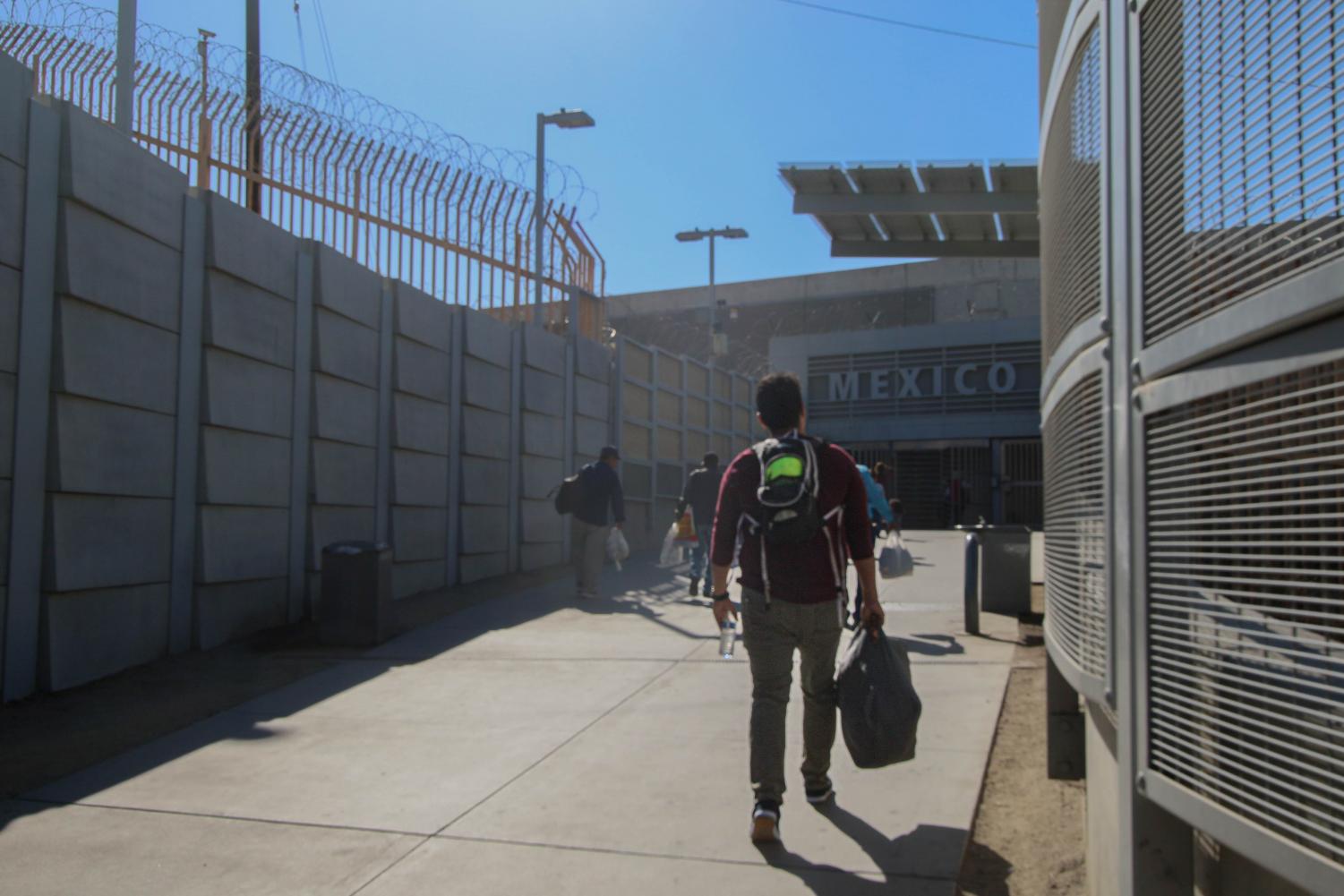Humanitarian pushes through traumatic past to help others
October 23, 2019
The Union traveled to Tijuana, Baja California to capture the stories of asylum seekers and refugees from countries including El Salvador, Honduras, Guatemala and Haiti. Quotes from asylum seekers were translated by The Union. Some sources requested their names be changed out of concern this story would affect their asylum status. Additionally, children’s faces have been cropped for privacy reasons.
Warning: Story contains explicit content
With sunglasses providing an extra layer of protection to his tan poker face, Emilio Pensado put on his backpack full of women’s and kid’s clothes and started the walk on foot from San Ysidro, California across the infamous United States-Mexico border to Tijuana.
Unfazed by the steel walls, spikes and concrete surrounding him, Pensado walked until he reached the line for the checkpoint.
Hoping the border patrol officer wouldn’t ask too many questions or check his bags, his story became more elaborate the closer he got.
Pensado told the officer he planned to visit family in Rosarito, a beach town just 30 minutes from Tijuana, and that he planned to stay three days.
As he zipped through the checkpoints and into the bumbling streets of Tijuana, he hailed a cab.
His day was just getting started.
* * *
Emilio Pensado is a 27-year-old theatre major at El Camino College who has pushed past his traumatic childhood, using it as the source of his humanitarian work and ultimately being commended by the U.S. Senate for his distinguished community service among asylum seekers and refugees.
Pensado grew up with his mother, step-father and five siblings in Inglewood, Calif. where from a young age he was exposed to a life full of gang shootouts and overdoses.
“I’ve seen a lot of people die, I’ve seen a lot of people suffer and I’m sure if those people had the chance to do it all over again they wouldn’t waste their time,” Pensado said. “It fucks with you a little bit but once you get used to that kind of shit you get a different perspective.”
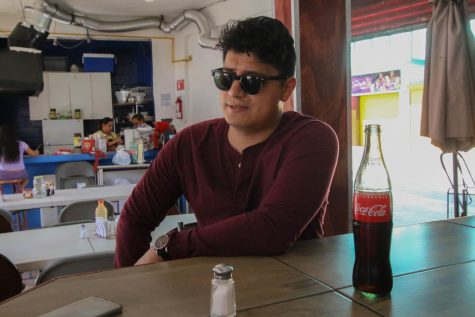
He knew he had to get away from the detrimental environment and was forced to mature at a young age, Pensado added.
Instead of playing with children his age at 13, Pensado worried about his credit score and started making plans to buy a house.
As soon as the opportunity to escape presented itself, he packed up his things from the family apartment on Prairie Avenue and 102nd Street, which has since been torn down and moved in with his grandmother to finish his education at Hawthorne High School.
“I would feel terrible because my grandma [would] be buying me all this stuff and my brothers were stuck with my mom,” Pensado said. “So I started working at a liquor store to try to help my mom out with some money.”
After graduating high school, Pensado trained as an emergency medical technician (EMT) at Coast Career Institute (CCI), where he survived a shooting in 2011 that left his instructor, who he admired as a father figure, dead.
“You can cry but it doesn’t change anything,” Pensado said. “Now it’s a thing where you know death exists and it’s just as real as falling and you just carry on.”
But Pensado does not sulk, instead, he said these kinds of events have given him a better perspective on life.
“It helped me appreciate the things I have,” Pensado said. “It pushes me to achieve my dreams.”
In 2015, after several years of working as an EMT and private security where he continued to witness people struggle with drug and alcohol abuse, Pensado decided to join a Christian church.
Through the church, Pensado was given the opportunity to travel to several countries, including Guatemala and El Salvador, where he could preach the gospel and perform humanitarian work.
“We built these churches out of wood,” Pensado said. “They were shitty churches but they were something I guess.”
His sympathy knew no limits for these families in need because in a way he could relate to a lot of them who are in a hopeless situation, especially the children who have no control over the environment they grow up in, he said.
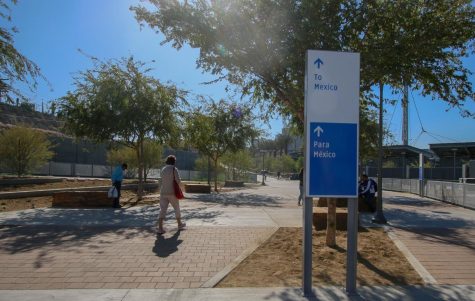
“Watching children die is probably one of the worst things I’ve seen,” Pensado said. “Moms would come up with their young daughters telling [us] to take them to the United States where they would have a better opportunity at life.”
But he couldn’t, he added.
While continuing his work across Latin America, Pensado accidentally stumbled upon an albergue (shelter) that specialized in asylees that were women and children, which resonated with him.
“I don’t see an escape for [migrant families],” Pensado said. “I put myself in their shoes and say ‘how could I escape’ if I was born where they were?'”
***
The golden cab jolted back and forth on the jagged Tijuana streets, zipping around corners of one of the world’s most dangerous cities.
Pensado scanned the city through the window, anxious to arrive at the albergue where he would distribute all the clothes in his backpack to the dozens of families stuck in Mexico while they await their U.S. asylum court dates several months away.
After 10 minutes of driving, Pensado arrived at an aluminum shack with “MOVIMIENTO JUVENTUD 2000 Tijuana A.C.” (Youth Movement) slabbed across a dirty wall in green paint.
Upon entering the gray, guarded fortress, Pensado was met by a crowd of children who anticipated the days until they would see him again.
They surrounded the clothes Pensado had brought for them; several children were more excited about the backpack and wondered if it was up for grabs.
“Seeing that those kids, they were so appreciative to have that backpack,” Pensado said. “You give that backpack to a kid in Los Angeles and he’s gonna say ‘what the fuck is this?'”
Dozens of staggering orange tents lined up against each other, filling up the 150 person capacity room where children and parents sleep on concrete floors for months at a time.
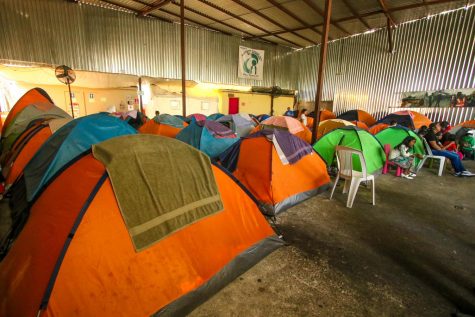
Some parents sit in foldable chairs staring blankly into the distance only for their weary eyes to be met by the only thing dividing them and persecution; a cold, lifeless aluminum wall.
In 2018, more than 100,000 families were apprehended at the southwest border, according to U.S. Border Customs and Border Protection agency but it is not specified whether all families were seeking asylum.
Through Donald Trump’s 2019 “Remain in Mexico Policy,” any migrant seeking political asylum in the U.S. must remain in Mexico while they wait to see a judge and present their case, immigration attorney and former ECC English professor Jeffrey Jung said.
The most obvious problem, for the people, is their fear being connected to staying in Mexico, Jung said.
Some Central American gang’s reach extends to Mexico, so whatever problems migrants are running from in their countries, could be following them to Mexico as they wait for their hearings, Jung said.
So far, more than 54,000 migrants seeking asylum from countries including Belize, Haiti and Honduras, have been sent back to Mexico to await court dates several months away, according to the Los Angeles Times.
Families arrested at the U.S.-Mexico border from 2013 to 2018
In addition, migrants being returned to Mexico as they await hearings face the dangers of being kidnapped, extorted or killed in Tijuana, which had a murder per capita of 138 people per 100,000 residents as of 2018, according to the Los Angeles Times.
Melissa Cruz, an asylee whose name has been changed in fear that the slightest issue may result in the U.S. denying her asylum, said she left Honduras with her family to escape violence and poverty, subsequently hoping to provide a better future for her young son.
Her family started their trek to the U.S. in June, reaching the border several weeks later.
Following a successful attempt at crossing the Rio Bravo they were arrested by border patrol and sent to a detention center in San Diego where they were harassed, she said.
“It’s very sad, I would like to forget it all. The treatment we received from U.S. officials was awful,” Cruz said. “They humiliated us to the point where we couldn’t speak, we were too afraid.”
Cruz added that an officer stated there was plenty of room to bury her family in San Diego if they refused to talk but after two days in a cold detention center, she was deported with her family to the streets of Tijuana as she awaits a hearing in December.
“[At the shelter] you feel like a family because everyone is going through the same struggle but Tijuana also scares people because of how dangerous it is,” Cruz said. “My intentions were never Mexico; I wish I could finish my objective and be with the rest of my family in the United States.”
However, there’s virtually no chance that they’ll be able to articulate her asylum claim without the proper representation, Jung said.
“I’ve seen a lot of people die, I’ve seen a lot of people suffer and I’m sure if those people had the chance to do it all over again they wouldn’t waste their time.” -Emilio Pensado
***
Pensado steps into the smoke of the shoe-box shaped kitchen inside the albergue and is welcomed by the smell of fresh pupusas stuffed with beans and cheese.
Dozens of the 135 asylees that call the albergue home lined up outside the kitchen door as the food was almost ready.
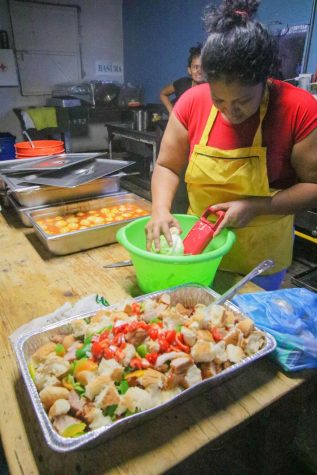
Without a smile on their restless faces, they got their second meal of the day and sat down.
“The first time I visited, this place was full of life,” Pensado said. “It seemed like a family before.”
Collecting as many resources as he can over a certain period, including clothes, toys and foods like cereal and eggs, Pensado makes the two-hour drive from L.A. to San Ysidro and prays border patrol doesn’t take anything away.
“We have everything here,” Pensado said. “It’s fucked up to say but I don’t really feel sorry for the homeless [in Los Angeles] because they’re surrounded by resources and if you go down to Guatemala, El Salvador, Belize or any of those places, they don’t have any.”
Many migrants are small business owners back in their countries who are extorted and refuse to pay, Jung said.
They come to the United States to seek a better life from the gangs and extortion but that is not usually enough to seek political asylum, he added.
Salvadorian refugee Wendy Munguia and ex-coordinator of the Movimiento Juventud shelter said she fled her country to escape the corruption between police and MS-13 gang members.
Ver, oír, y callar si de la vida quieres gozar is a common expression in El Salvador for anyone that has witnessed any crime, meaning that if you see or hear something, don’t say anything, if you want to continue enjoying life, Munguia said.
Munguia fled El Salvador with her young daughter after police raided her home in an attempt to kill her then-boyfriend, she said.
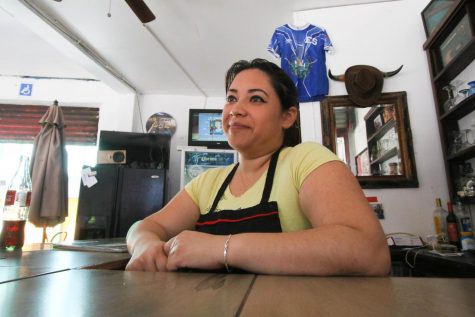
“There are jobs, there’s money in Central America but the gangs are violent and along with police, they demand weekly, monthly quotas,” Munguia, whose brother was killed last year as a result of the violence, said.
On her journey to the U.S.-Mexico border, Munguia and several migrants were stopped by corrupt police in Sinaloa, home of the Joaquin “El Chapo” Guzman’s Sinaloa Cartel, where they stole what little money they had for food, she added.
Munguia said she was also stopped several times by members of Jalisco’s Nueva Generación (New Generation) cartel, while aboard the infamous train La Bestia (The Beast) where they threatened all the migrants with death had they not had children with them.
Eventually, she joined the Honduran caravan headed towards the U.S. and sought political asylum.
As she waited for her hearing, she settled down with her daughter in the Movimiento Juventud albergue and became the coordinator last March, revamping the whole place with the help of Pensado.
“Emilio is very insistent on helping; it’s surprising and admirable,” Munguia said. “Other people give up on the cause after one or two times.”
But after a while, Munguia said being the coordinator was not fulfilling, she wanted to give her daughter more. So she gave up her hope of living in the U.S. and applied to become a permanent resident of Mexico.
Munguia became a permanent resident of Mexico this year and now works in a small restaurant a few minutes away from the albergue but no longer resides there.
“It’s nice to support the albergue because I arrived under the same circumstances as everyone else looking for asylum,” Munguia said. “But I believe whatever you can do in the U.S. you can do in Mexico.”
***
Along with Movimiento Juventud, Pensado and Munguia keep an eye out for several shelters throughout the city, including Casa de Immigrantes (House of Immigrants), which also focuses on housing women and children.
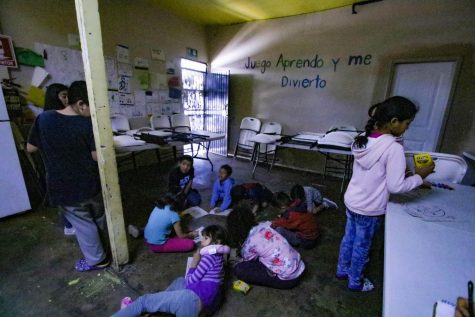
Pensado said he has plans to do his humanitarian work on a grand scale, hoping to get several U-Haul-like trucks to take donations across the border by the tons.
But difficulties have presented themselves along the way, he said.
“Obviously this is on my own dime and shit gets complicated after a while,” Pensado, who currently works as a defense contractor while trying to fulfill an acting career as an ECC student, said.
When the donations Pensado attempts to cross the border with are not itemized, border patrol takes them away because they think you are going to sell the stuff in Mexico, he said.
Other times, albergue owners ghost Pensado, not taking his calls for long periods, including Jose Ma Garcia Lara also known as Don CheMa of Movimiento Juventud.
Garcia Lara agreed to meet with The Union in his Tijuana albergue on Friday, Oct. 4 but he did not show.
“If I have to kiss his ass to help those kids and help those people; just to deliver shit, I’ll fucking do it,” Pensado said. “Sure maybe I can’t turn their lives around but I guess that’s one of my only regrets right now; that I’m not more successful in order to give more.”
But Pensado keeps on trying, already earning a few roles, including in the FX Network series “Mayans M.C.,” an extra in “Star Wars: The Rise of the Skywalker” and the Spanish-language dating show “12 Corazones.”
“Acting is amazing because I just feel like I’ve always had the ability to step out of myself and put myself into other people’s shoes,” Pensado said. “This is my true passion, I don’t care about [contracting] but it pays the bills.”
In the future, Pensado hopes to open up his own albergue in Mexico for women and children but know’s it won’t be an easy task, he said.
With winter approaching and the open roof of the Movimiento Juventud shelter letting everything in, Pensado worries the migrants will continue to suffer in silence.
“If you have any clothes and you know an organization or somebody like me, it doesn’t cost you anything to grab all the shit you don’t want,” Pensado said. “Give it to them and let them handle it.”
Pensado has started a GoFundMe account titled “Children’s House of Hope” with an end goal of $7,500 dollars to get migrant families the proper supplies as they brace themselves for the upcoming winter.
We want to give them basic human needs, he added.
“If we can help out with the gas or water bills, it wouldn’t be so bad on top of shit they already have to go through,” Pensado said.
***
After several hours visiting Movimiento Juventud and catching up with Manguia at her new restaurant job, Pensado hailed down another cab.
“You’re about to taste the best tacos in the city,” he said.
Happy #NationalTacoDay from us here @ECCUnion as Editor-in-Chief @ECCUnionHaro and Photo Editor @eccunionrose make a quick stop during their #news coverage in #Tijuana, Baja California to commemorate the day. Be on the look out for a big story coming soon. #ECCUnion #tacos pic.twitter.com/9eJOxQbs7g
— The Union (@ECCUnion) October 4, 2019
The men serving food moved with such ease, throwing salsa up in the air and catching it with a corn tortilla filled with steak, chicken or pork along with several other options.
There are thousands of refugees scattered throughout the city that even the most unaware visitors can see how migrant culture is engrained in daily Tijuana life, Pensado said as he ate.
But migrants also have a false narrative of the United States, they think that because we are making money that we are here thriving and happy,” Pensado said. “But we’re tormented by bills, credit scores and the materialistic.”
After eating, Pensado made his way back across the United States-Mexico border where he put on his sunglasses, his poker face and said very little.
He was already planning his next trip.
Pensado plans on visiting the families at Movimiento Juventud Wednesday, Nov. 20 for a Thanksgiving surprise.
To make arrangements for physical donations, contact Emilio Pensado at TheDefenseSpecialist@gmail.com
For monetary donations, visit: https://www.gofundme.com/f/childrens-house-of-hope

